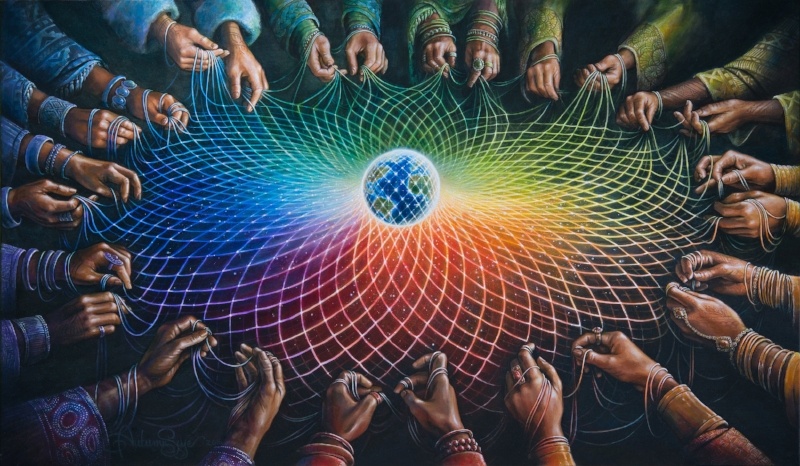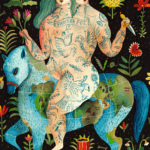

Caroline Manière Psychedelic Myster
This book is a stitching process, trying to bring back into contact what has become separated and separate. Trying to reconnect us to a lost feminine wisdom and lineage and to its capacity to bring us back into a state of greater wholeness.
We are living through times in which huge collective splits are becoming amplified on the wider world stage. We come to see clearly how the wound of separateness has become infected and oozes out of every societal pore. It seems that unless things become infected there is little hope of action. Like most patients that enter therapy, we tend to look inwards once our defenses have collapsed and our symptoms have become intolerable. Our collective defenses are certainly overstretched and we are standing on a dangerous edge, called to either integrate or demise.
This book, the restoration of the feminine, the psychedelic experience, are all deeply political matters. Max Dashu writes:
“The practice and ways of medicine have political ramifications because they represent direct spiritual power, energy that cannot be controlled by man-made hierarchies or systems of domination” ( p.60).
Separateness is systemic. It starts with the Other and it creeps into our most intimate connections including our relationship with Self. Likewise, oppression that arises out of the altar of separateness is also systemic. It is the feminine, it is the colonized nature, it is the underprivileged, the third world countries, the refugees, the homeless and displaced that are the weakest link in our society. In systemic thought they say a system is as strong as its weakest link. The weakest links are not negligible. They are where care and attention need to be directed at the most. Make no mistake, all these things are linked and our response to them is also linked. All these things are political and our response to them can be nothing less than a rebellious one. We have to face our current challenges with solid enough ethics, integrity and determination to survive the tension, or risk being ripped apart.
This collection of essays has come out of a deep sense in us as well as in what we are witnessing in the collective whole, of the need to re-member the feminine essence back into consciousness. The feminine we call on in this book is not confined to female bodies, it is part of every soul. Every collective energy belongs to all of us collectively. Kathleen Harrison asks of us:
“It’s important to realize how we each hold within us the masculine and the feminine elements-these well-met opposites are swirling, dancing arm-in-arm, or sometimes in battle. But they are both always within every single one of us.” ( p. 146).
The feminine we call on in this book resides in women as well as men and needs to be nourished and strengthened in all of us, for all of us.
The feminine consciousness restores our awareness of our interconnectedness, with each other as a species, with all other species and nature, as part of a glorious, incredibly intelligent and purposeful, ecosystem. An ecosystem that is fully alive. The feminine knowing of interconnectedness points us back to our shared source in the all emerging void. It reminds us that as we stand on the thresholds of life and death, we are all equal in our collective fate, whichever culture, class or creed we come from. In matters of life and death we return to our shared humanity and our true size. We are all but specs of dust in this magnificent tapestry of life. Our part and role here is to be of service to the life of what needs to live and to the death of what needs to die. To take our place fully in the responsibility and the consequence of it all. Humanity in its greed has become destructive and has aligned with the forces of death and disintegration. When disintegration is serving regeneration, like the death of winter that feeds the spring ahead, it is also in service to life. But the disintegration that humanity is engaged with at the moment is threatening life all around us.
This book aims to address the inequalities within psychedelic culture by bringing more feminine voices and matters to the surface. By bringing the unseen into greater view. This book does not address all the inequalities we are fostering in our community, it points to some and there are more to look at. The proportion of those that are well off in today’s world, with the proportion of women that have managed to lead safe lives, to the proportion of nature that is still vibrant, are sadly interlinked. One cannot be recovered without the other. We need a wide systemic lens to address what is infected in our world today. And most importantly, we need compassion, to make space for the dialogues that will bridge all the Otherness this world has fallen into.
Re-membering the vitality of feminine consciousness, her lost lineage and practices, her deeply embodied intuitive wisdom, will be a much-needed resource for our challenges ahead. Chiara Baldini tells us that:
“Women played a fundamental role in the administration of these rites and altered states of consciousness were a “spiritual technology” used to attain mystical knowledge about the paradoxical nature of reality and human’s places within the natural world”. (p. 78).
In this book we are calling on the Feminine that resides within us all, alongside nature, and her regenerative capacities for integration. In order for humanity to move forward it is essential that we recall and integrate whatever human capacity has remained underdeveloped and delegated to our collective shadow. Instead of consistently relying on an overdeveloped one-sidedness, we need to look for the feminine qualities, that are dormant potential in all of us, and here we will find treasures long lost and forgotten, the secret medicines we all long for whichever side of the divides we fall on.
“In times when the patriarchal excesses of modernity seem to be bringing us closer and closer to planetary collapse, psychedelic and plant medicine seem to be potentially powerful tools and allies in our quest to shake off the grip of those systems from our individual and collective consciousness. This is an essential step towards a more conscious paradigm of integrated and mature masculine-feminine synergy and a better integration between rational and erotic medicine.” (Adam Andros, p. 252).
Psychedelic and altered states allow us a unique access into our personal and collective shadow. They unearth what has been lost or hidden in this space that holds peril alongside potential, and can return us to a wisdom that we deeply thirst for. In the realms of feminine consciousness, we will retrieve the medicines of interconnectedness, fertility, regeneration, compassion, embodied wisdom, feeling, kinship and belonging. If all these forces returned to our world a deep restructuring would take place.
Humanity has fallen captive to a “great forgetting”. We go through cycles of collective events that don’t get assimilated and we find ourselves compelled to compulsively repeat the trauma. We have come up against immense resistance from the ossified status quo towards the inevitable collective changes we are being called to navigate. As we stand before the thresholds of sociopolitical and environmental breakdown we will need all the resources we can master. We will need to transcend our structural and self-imposed limitations of Otherness, separateness and isolation.
Clarissa Pinkola Estes writes:
“In intercultural inquiries, I have been impressed with groups that are pushed out of the mainstream, and who yet retain and strengthen their integrity even so. It is fascinating to see that time after time, the disenfranchised group that maintains its dignity is often eventually admired and sought out by the very mainstream that once ousted it”.(p. 490, note 13)
I am glad someone has put this process into words. It lays bare our responsibilities and the consequences of how we attend to our wider psychedelic culture. It is inevitable that psychedelic culture will leak into the wider culture once again, we are already seeing clear aspects of that. I am not here to declare this as a victory or a foe, I think it is a fragile process that will unearth a lot of shadow on the way, but it is essential that we maintain awareness of our values as a community throughout it all. We have to tend to our internal dynamics, knowing that we are caring for a baby that will grow into adulthood and enter society at large. Do we want that offspring to bring something of value to the world? Do we want it to carry something vibrant, integral and potent within its soul? Do we want it to carry the seeds of change forward? If so we have to disentangle our community, movement, whatever you wish to call it, from its embrace with the oppressive discriminatory dynamics of wider culture. We don’t want that child going back and carrying more of the same. If we want it to make a real difference we have to make sure we cultivate its capacity to integrate division and its ability to stand in the potent, fertile wisdom of greater wholeness, where everything has its place and is strengthened by respectful collaboration.
This book aims to bring back the feminine in its many forms and guises into clearer view, for the psychedelic culture to be fed, inspired, touched, and mobilized by. The wider psychedelic community, resourced by the vision of feminine and altered states must meet our current challenges from the forefront of inclusivity, matching visionary poetics with decisive action.
In closing I will leave you with the words of Anna Luke:
“This is a call to the dark tides of menstruation rather than the clinical exactness of mensuration; a call to the slippery, elliptical, wet, delicious, beating heart of the darkness. This darkness is not of the grave, but of the regenerative darkness of the womb”. (p. 166)





